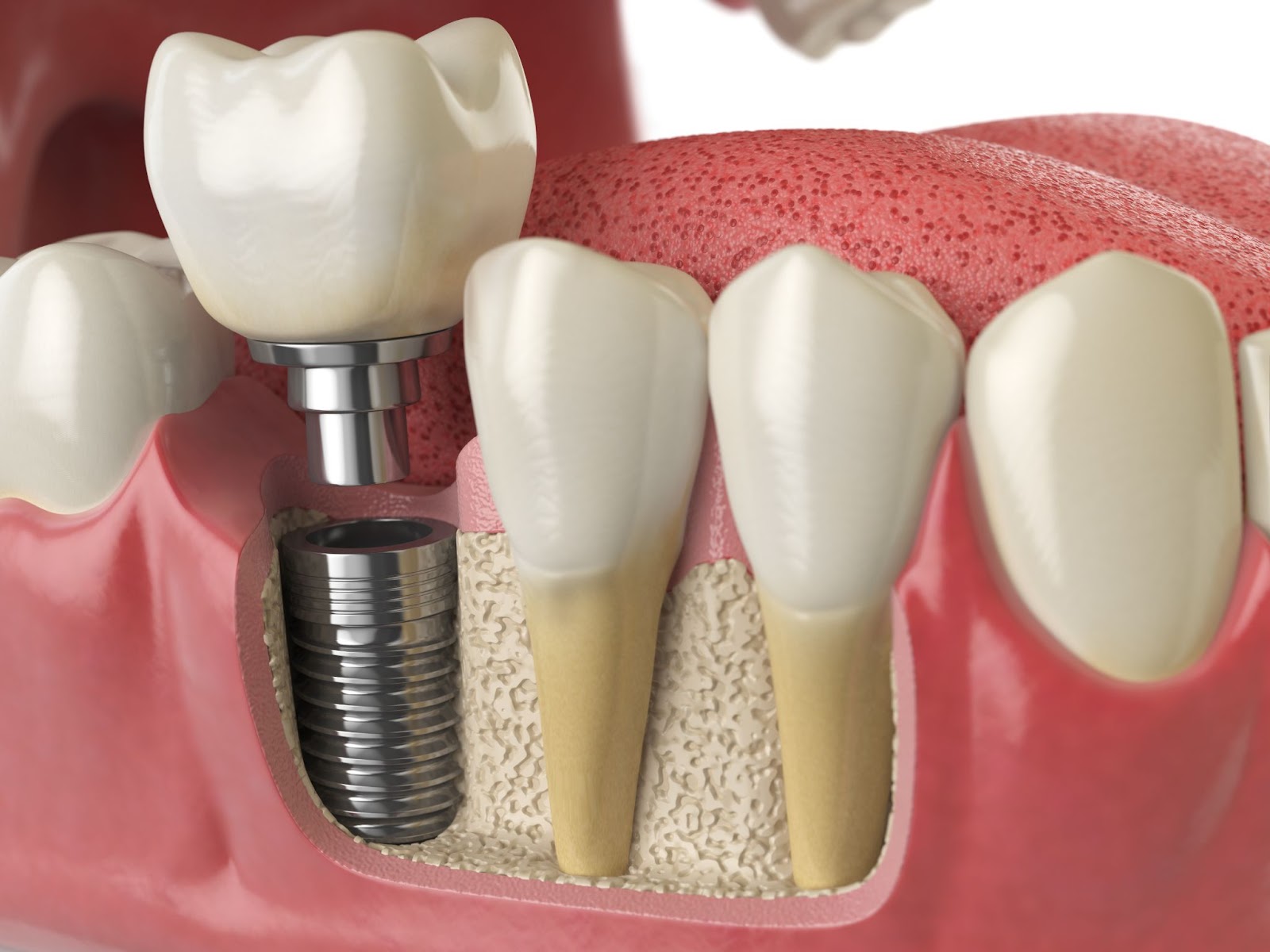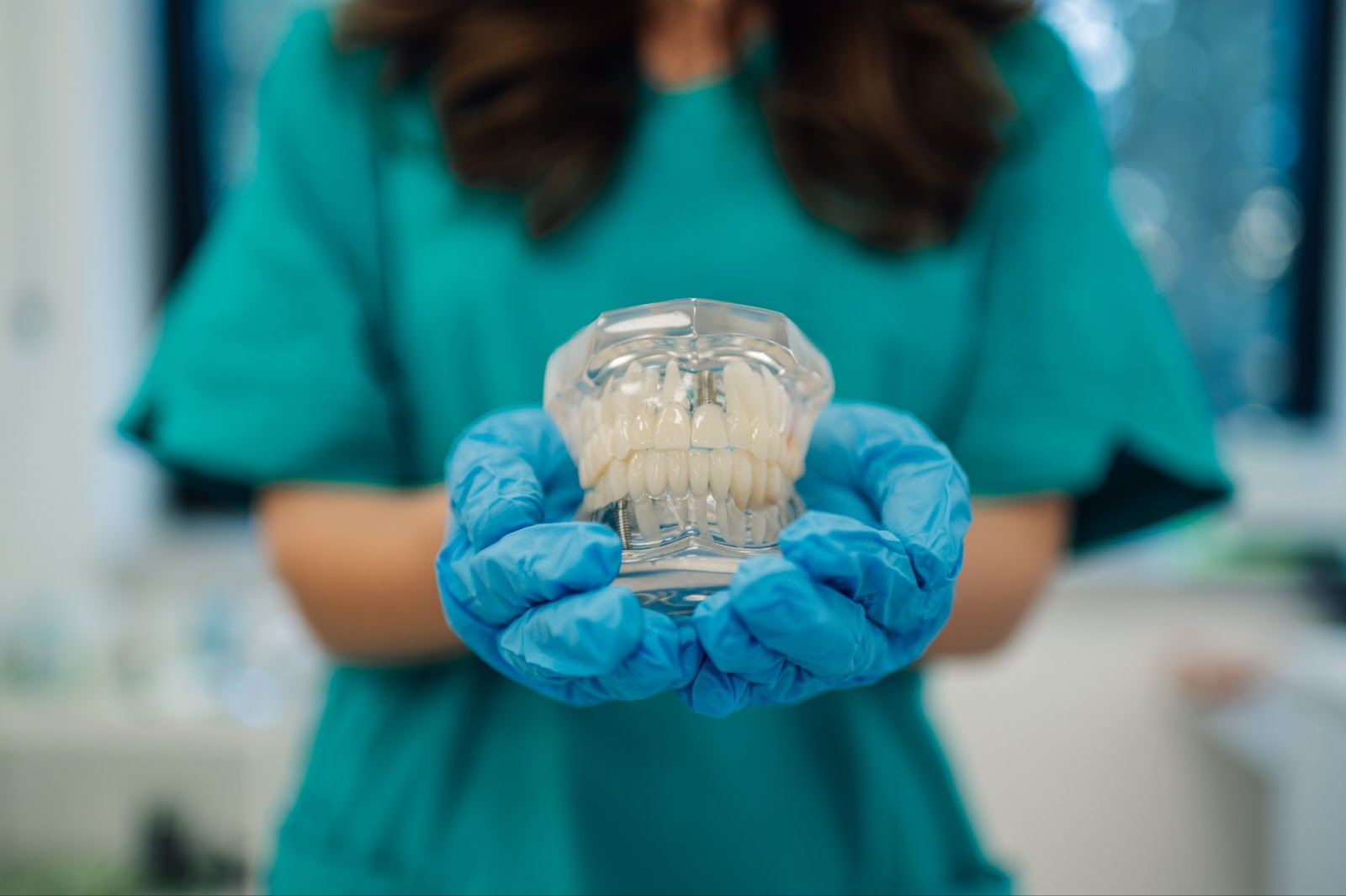Missing a tooth can affect more than your smile. It changes how you eat, speak, and even how your jaw feels. Dental implants have become an alternative choice for replacing missing teeth because they look and work like real ones.
Unlike dentures or bridges, implants are fixed. You do not take them out at night. They stay in place, anchored to your jawbone. If you have lost a tooth or two, dental implants could help you regain both comfort and confidence.
Need dental implants? Reach out to The Braces Practice Singapore via WhatsApp or our contact form for any enquiries!
What Are Dental Implants?
A dental implant is a small titanium post placed into your jawbone. It acts like an artificial tooth root. Once it is integrated into your bone, your dentist adds an abutment, a connector that holds the crown, which is the visible part that looks like your tooth.
There are a few types of implants:
- Endosteal implants – placed directly into the bone; the most common kind.
- Subperiosteal implants – placed under the gum but above the bone, often used when bone volume is low.
- Mini implants – smaller options for limited spaces or temporary fixes.
Who Is a Good Candidate for Dental Implants?
Most healthy adults can get dental implants. You will need strong gums and enough bone to hold the implant.
Good candidates often:
- Have healthy gums and no active gum disease.
- Have enough jawbone volume for support.
- Do not smoke or are ready to quit.
- Have no uncontrolled medical conditions like diabetes.
A dental consultation is essential. Your dentist will take X-rays or 3D scans to check bone structure and plan the treatment. Teens usually need to wait until their jaw has fully developed.
(Source: Envato)
The Dental Implant Procedure: Step-by-Step
Getting a dental implant takes several stages. It is not a single appointment, but a process that builds a strong, lasting foundation for your new tooth. Here is what usually happens:
- Consultation and planning
Your dentist examines your mouth, reviews X-rays or scans, and discusses your options. This is where you will learn how many implants you need and whether bone grafting is required.
- Tooth extraction
If a damaged or decayed tooth remains, it is gently removed. Healing time may follow before the implant is placed.
- Bone grafting (if needed)
When your jawbone is too soft or thin, a small graft helps strengthen it. This step ensures the implant has enough support.
- Implant placement
Under local anaesthetic, the titanium post is inserted into the jawbone. This acts as your new tooth root. The gum is then stitched closed for healing.
- Healing and osseointegration
Over the next three to six months, the bone naturally fuses with the implant, making the foundation solid. This process is called osseointegration.
- Abutment placement
Once the implant is secure, your dentist attaches a small connector (the abutment) to hold the crown.
- Crown fitting and final restoration
A custom-made crown is placed on the abutment. It matches the colour and shape of your surrounding teeth. This completes the treatment and restores your smile.
Most patients find the procedure manageable. Mild soreness or swelling is common for a few days, but pain relief usually helps. Once the implant settles, it feels and functions just like a natural tooth.
Recovery and Aftercare
Healing after dental implant surgery takes time, but most people return to their usual routine within a few days. You may feel mild soreness or notice slight swelling, but it is normal as the area adjusts to the dental implants.
For the first few days, choose soft food that is easy to chew. Avoid chewing near the implant site until it heals. Keep your mouth clean by brushing gently and rinsing with warm saltwater. Skip smoking and alcohol as they slow recovery.
Follow-up visits matter. Your dentist will check the healing process and ensure the implant is fusing properly with your jawbone.
Once healed, care for your dental implants the same way you care for natural teeth. Brush twice daily, floss, and keep up with routine dental check-ups. Good oral hygiene protects the implant and surrounding gums, helping it last for many years.
(Source: Envato)
Common Risks and Complications
Like any procedure, there are risks to be aware of. Knowing them helps you prepare and care for your dental implants properly.
Possible issues include:
- Infection at the implant site if bacteria enter during or after surgery.
- Nerve irritation, which may cause tingling or numbness in nearby areas.
- Sinus problems when implants in the upper jaw extend too close to the sinus cavity.
- Implant failure, which happens if the bone does not fuse with the titanium post.
These complications are uncommon, especially when treatment is done by an experienced implant dentist. Good oral hygiene, regular check-ups, and following aftercare advice reduce the chances of problems.
If you notice pain, swelling, or movement around your implant, contact your dentist early. Prompt care can prevent long-term issues and keep your dental implant secure for years.
Benefits of Dental Implants
After learning the possible risks, it helps to see why dental implants are one of the choices for replacing missing teeth as they improve how your mouth functions every day.
Here is how dental implants help you:
- Stable chewing and speech – You can bite, chew, and speak without worrying about movement.
- Natural look and feel – Each implant is designed to blend with your existing teeth.
- Bone preservation – Implants keep the jawbone active, preventing bone loss that often follows tooth extraction.
- Protection for nearby teeth – Unlike bridges, implants do not rely on neighbouring teeth for support.
- Long lifespan – With proper care, a dental implant can last for decades.
Alternatives to Dental Implants
While dental implants suit many people, they are not the only way to replace missing teeth. Some patients choose other treatments due to cost, health, or bone structure.
Here are the main alternatives:
- Dental bridges
A bridge fills the gap using the teeth on either side as anchors. It is fixed in place and can look natural, but it may require reshaping healthy teeth.
- Dentures
Removable dentures replace several missing teeth at once. They restore basic function and appearance, though they can sometimes feel less stable than implants.
If you are unsure which is best, speak with your dentist. They can explain how each option compares and help you decide whether dental implants or another treatment suits your situation.
Frequently Asked Questions About Dental Implants
Do dental implants hurt?
Most patients say the procedure feels easier than they expected. Local anaesthetic keeps you comfortable during surgery, and any soreness after can be managed with simple pain relief.
How long do dental implants last?
With proper care, dental implants can last 20 years or more. Regular brushing, flossing, and check-ups keep them in good shape.
Can anyone get dental implants?
Most adults can, but your dentist will first check your gums, bone density, and overall health. Conditions like gum disease or diabetes need to be managed before treatment.
Conclusion
Dental implants can restore not only your smile but also how you eat and speak. They are a strong, fixed, and lasting solution for missing teeth.
If you are thinking about getting one, talk to a licensed dentist. A quick consultation can tell you if you are ready to start your journey to a complete smile.
Need dental implants? Reach out to The Braces Practice Singapore via WhatsApp or our contact form for any enquiries!








